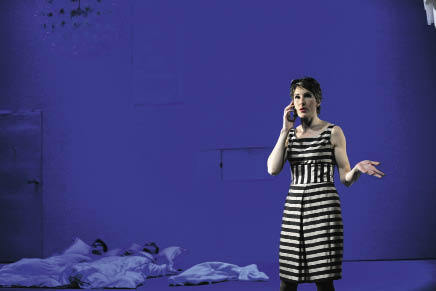Six Degrees of Separation
Old Vic, until 3 April
The Little Dog Laughed
Garrick, booking to 10 April
Even those who’ve never entered a theatre know the title. John Guare’s 1990 play, Six Degrees of Separation, tells of a penniless black hustler, Paul, who inveigles his way into New York’s upper-class society by claiming to be the son of Sidney Poitier. The couple he bamboozles are art dealers. Wily, avaricious and insecure, they work without a gallery and instead operate in the shadows of parties and restaurants, like illicit bookies, speculating in works which they own briefly and then ‘flip’ to the next greedy broker or syndicate. Dealing invisibly makes them attractive to clients who are anxious to conceal their wealth from respectable muggers like the revenue or the ex-wife.
Guare’s many-layered script is full of astute cultural observations. That the art market is a fruit machine for rich philistines is hardly a new idea but it’s still worth dramatising. By giving his Manhattan yuppies no professional location, no fixed abode, he slyly hints at an equivalence between them and the con artist who arrives at their door one evening. They take him in. And he takes them in. Each character here is a nomadic drifter surviving on his charm, brains and daring. So this is a symbol of the American dream. It’s also a lamentation on the emptiness of ambition. The rich couple recognise how vacuous their gilded lives are and yet by the play’s end they have achieved a kind of validation thanks to the envy of the ambitious tramp who’s desperate to emulate them.
The script works like a prism with mirror-like surfaces. Commentators think they’re interpreting it when they’re merely reciting their own prejudices. Some see the charming black hustler who hijacks America’s élite only to be exposed as a dazzling charlatan as a prophecy of Obama. He could be Robert Maxwell or Charles Ryder. He could be Hitler. He could be Boris. The little-known actor Obi Abili gives a terrific performance as Paul, playing him with grace, charisma and absolute authority. This is a breakthrough role for him but not everything is perfect in David Grindley’s production. The weird set seems contrived and inflexible. The Manhattan flat is represented by a wraparound screen painted Rothko red and enclosing a sofa. It’s serviceable enough until Act Two, when the script has an attack of wanderlust and goes skedaddling off around the city. The scarlet backdrop has to suggest Central Park, a police station, a phone booth, a student dive and other places. That’s only a minor niggle. Ultimately, the chief imperfection of this iconic play is Guare’s distaste for the world his characters inhabit. But perhaps that’s my distaste, not his.
I had no such uncertainties at The Little Dog Laughed, another upper-class comedy of manners from America. The playwright Douglas Carter Beane aims his barbs at Hollywood and its class of feckless actors, rapacious producers, and pompous, self-adoring screenwriters. He doesn’t find them distasteful at all, merely hilarious. In some respects this satire is the play that Martin Crimp’s rewrite of The Misanthrope, currently showing at the Comedy Theatre, wants to be. Crimp’s take on the movie world fails partly because Versailles is an imperfect fit for Hollywood and partly because he doesn’t have a comedy specialist in the lead role. It’s strange how often this elementary law is forgotten. A comedy can’t be carried by a straight actor any more than a motorbike can be carried by a donkey.
Tamsin Greig, starring as Diane in The Little Dog Laughed, is more than just a specialist, she’s a once-in-a-generation rarity, a performer who can make a thousand people laugh by partially lowering one of her eyelids. Diane is a ruthless agent who wants to transform a rising young actor into a superstar by placing him in the movie version of a hit Broadway romcom. The wrinkle is that the actor is gay and doesn’t see why he can’t share this news with the rest of the world. Happily, this isn’t a campaigning play. It touches on the repression issue but it doesn’t want you to wear a wristband.
The script finds brilliant and unexpected laughs in the intricacies of screenplay contracts. ‘A writer with final cut?’ shrieks Diane. ‘I’d rather give firearms to small children.’ She’s well supported by Rupert Friend, as the closeted actor, and by Gemma Arterton whose performance is besparkled by some of Greig’s stardust. A satirical take on the brittle, heartless world of Hollywood needs to be done with a lot of warmth and this show’s cordiality is irresistible. The West End is so chocka with great recession-busting entertainment right now that some of us can’t wait for the next slump. This is one of the best. Grab a ticket. It won’t let you down.







Comments